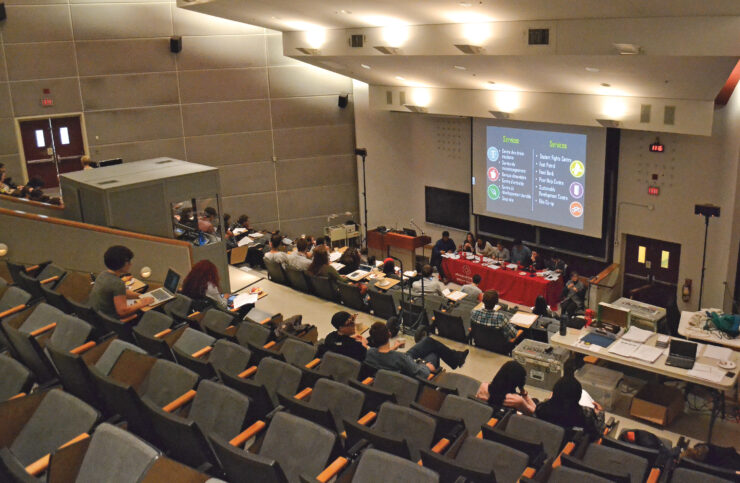Students raise concerns over lack of motions, while SFUO says it’ll stick with GAs
The Student Federation of the University of Ottawa (SFUO) held its third General Assembly (GA) and, while it was held on campus, it failed to meet quorum. The event was held in Marion Hall on Nov. 14 at 10 a.m.
The SFUO instituted GAs two years ago after a referendum, and held two last year, but both failed to meet quorum—the first by a dozen people, the second by 230.
The upward trend continued at this GA—it missed quorum by 286 people. Forty people showed up falling far short of the quorum of 326 people (one per cent of the undergraduate student population).
No motions
Previous GAs saw a variety of motions submitted, touching on a variety of issues such as election reform, bilingualism, and fiscal responsibility. However this year none were submitted to the SFUO before the Oct. 16 deadline. Even if quorum isn’t reached, motions are carried over to the next GA.
Although there were no motions, the GA continued with the rest of the agenda. This included updates from all of the SFUO executives on SFUO-run businesses and events, as well as an overview of the budget. It also featured a 20-minute question period.
“We did our best to make sure that students know about the deadlines and procedures,” said Roméo Ahimakin, vice president of services and communications.
“Maybe it speaks to the fact that right now there is no particular motion that students want to bring forward,” he said. “But we’ll keep doing our best… when the time comes and students want to submit a motion they’ll do exactly that.”
One student believes that mishandling of prior motions may have played a role in the lack of submissions. Brett Byers-Lane, a political science and communications student at the U of O, alleged that paperwork he submitted to the previous SFUO was mishandled, which deterred him from submitting again.
“This is the sort of thing that’s happened with many students,” he said, “and so it comes as no surprise that we’ve had the turnout that we’ve had.”
Room for improvement
The question period was open to any subject, but the most popular topic was the GA itself.
Byers-Lane said during the question period that the SFUO should do more to make the GAs appealing to students, using their recent “Strip Spelling Bee” as an example.
“People will voluntarily go to an event that is entertaining and fun,” he said. “You can’t just give people coffee and a croissant and expect them to beat their head against a wall.”
At the start of question period Benjamin Rivet of the Revolutionary Student Movement (RSM), which originally proposed the idea of holding GAs, criticized the GAs for not being more effective.
“General assemblies are intended to function as the governing body of the Student Federation, not just a tool to make suggestions to the executives” he said. “We want to see a direct action such as a committee taken to encourage better attendance—the general assemblies need to make quorum.”
The SFUO has stated that it will meet with members from the RSM to discuss how to improve the GAs.
Ahimakin said that while he was happy with the event, the SFUO would do more to make the next one a bigger success.
“We all really wanted to have quorum, so that we can all sit down and talk about every single aspect of the Student Federation,” said Ahimakin, adding they would increase the amount of promotion for the next GA.
In terms of promotional efforts, Ahimakin said that this year the SFUO put up posters, sent three mass emails, created ebulletins, gave class talks, and increased presence on social media. However no posts about the deadline to submit motions are currently visible on the SFUO Facebook page, and no tweets were sent from the SFUO’s official twitter account, although there is promotion for the event itself.
“It’s the responsibility of all of us as students on this campus,” he said. “We all need to share that information and make sure to be there.”
Time to do away with GAs?
One hurdle GAs have had to overcome is the cost of the event—last year’s event ended up costing around $5,000. SFUO’ vice-president finance Camelia Touzany said she couldn’t yet comment on the cost of the GA—which included translation services and equipment, as well as food—but she said that holding the event on campus significantly reduced the cost.
Ahimakin says the SFUO has not entertained the notion of abolishing the GA, and only wants to improve them.
“It’s a platform that is the most democratic possible,” said Ahimakin. “I think there’s no argument to take away the GAs, there’s only an argument to make sure that it happens, and that it happens in the best way possible.”





